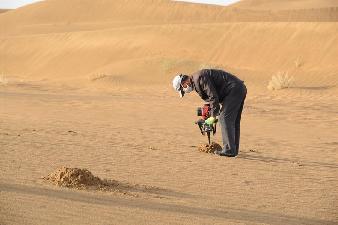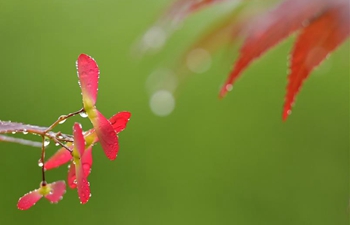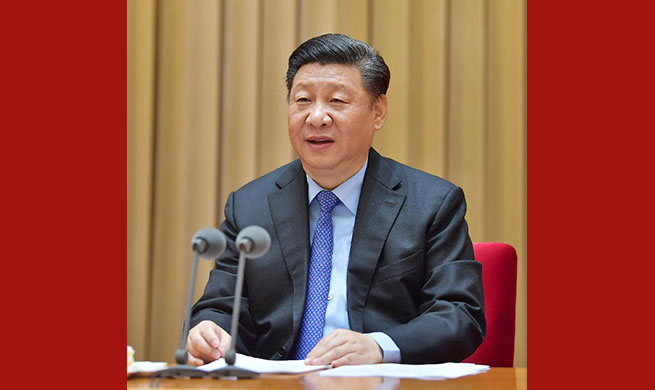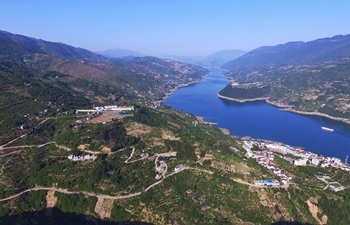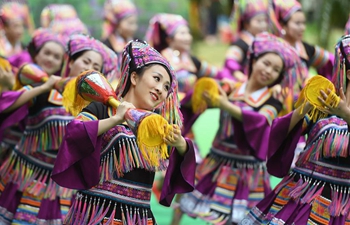by Juan Limachi
LIMA, April 21 (Xinhua) -- After more than 500 years, Quechua, the language of Peru's ancient Inca civilization can again be heard in the halls of power, at least in the judicial branch.
Judges, prosecutors, defense attorneys, clerks and other judicial officials in the Spanish-speaking country's capital Lima are taking a course in the indigenous Quechua language.
Judge Janet Tello Giraldi, president of the Commission for Vulnerable People's Access to Justice, inaugurated this week the first class, which was attended by 40 students selected out of a total of 700 who signed up.
The objective of the course "is for judges and those working in the judicial branch to learn this native language, and allow speakers of Quechua the right to justice," Tello told Xinhua.
During the early years of the Spanish conquest of Peru, the language of the indigenous population was commonly heard in legal cases as written testimony of the times show. But as Spanish became the dominant language, Quechua was slowly phased out.
Today, nearly 4 million Peruvians primarily speak Quechua. Most live in remote or marginalized areas, and those who need recourse to the legal system are often at a disadvantage due to the language barrier.
"We are going to need resources and political will to make this (knowledge of Quechua) understood as a real necessity in the use of legal services," said Tello.
For now, the training program is set to continue through 2021.
"We are already planning a second group, but it definitely won't accommodate the 700 people who signed up," she said.
In the first class, students, ranging from elderly judges to young clerks, learned basic phrases, including "What's your name?" (Imataq sutiki?).
The new initiative provides two fundamental human rights, said Tello, "the right to speak your mother tongue and the right to justice."
The beginner's course comprises 16 sessions over a two-month period, that will be followed by the next level and so on.
Student and Senior Judge Jorge Castaneda, who has more than 30 years of experience in the judicial system, said he has seen hundreds of indigenous plaintiffs and defendants over the years who struggled with the language barrier.
"Peru is a Quechua-speaking country, but regrettably, since the domination of the Spanish, we have forgotten our mother tongue," said Castaneda.
"As a judge, I have the obligation to know Quechua in order to understand and explain to people who come to the judicial branch, whether as plaintiffs or defendants," he said.
The course should be provided to higher courts across the country, he added.
"Firstly, speaking Quechua allows you to learn about the pain and suffering of the different sides (in a case), and secondly, the (Quechua-speaking) side that approaches the judge is going to have the confidence to explain his problem," said Castaneda.
Peru's Quechua-speaking communities are concentrated in the regions of Ayacucho, Apurimac, Cusco, Cajamarca, La Libertad, Huancavelica, Huanuco, Junin, San Martin and in Lima's more populous neighborhoods, home to many rural inhabitants who have migrated to the city.
The course is being taught by professor Raul Cisneros, a native Quechua speaker who studied languages and literature at Ayacucho's University of San Cristobal de Huamanga, and who exclusively spoke Quechua until his family moved and enrolled him in a public school at age nine.
Cisneros said he remembers that during Peru's years of political turmoil in the 1980s and 1990s, Quechua speakers who had been victims of violence and sought justice were often revictimized by a system that simply did not understand them and didn't try to.
Teaching Quechua "is a way for us to provide ourselves justice," said Cisneros, who also gives classes to the general public at a cultural center in Lima.
Cisneros and his students agree the course reflects a new awareness in Peru of the importance of valuing its cultural heritage and ancestral roots.






